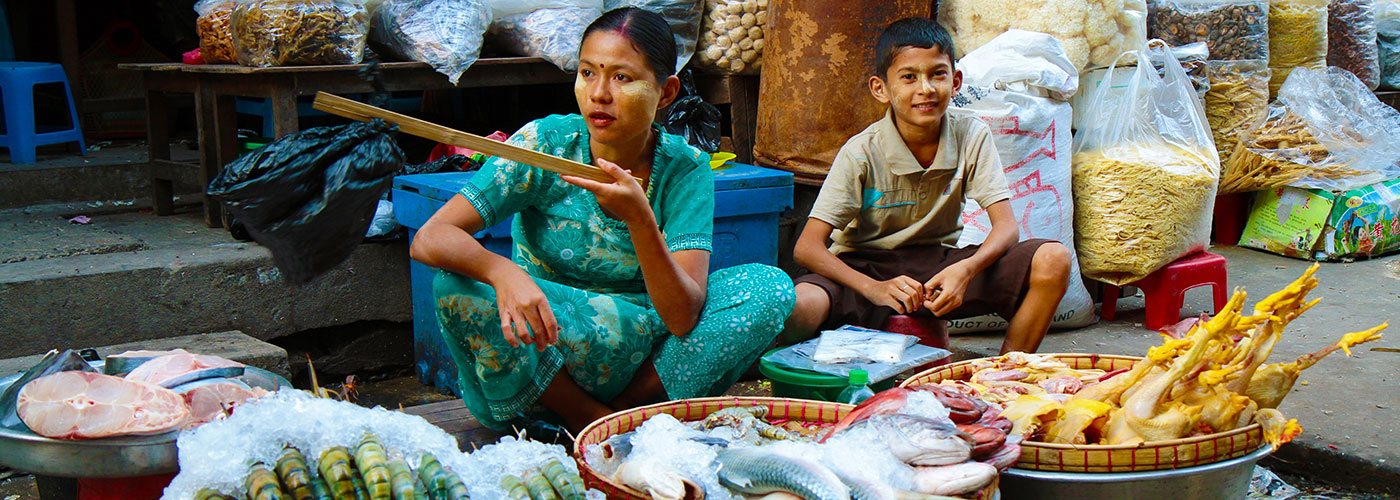A massive mobile rollout and untapped, unbanked population makes Myanmar seem like the ideal place for mobile money to take over. Despite the hype, however, cash is currently still king – although providers are seeing growth and more players are on their way into the market.
“In Myanmar’s case, if you look at the macro factors, it’s a perfect case for mobile money to work,” said Thura Soe Paing, Director and Co-founder of Frontier Technology Partners, which co-owns a mobile money service in Myanmar called myKyat. “However, it doesn’t mean it will work.”
SIM card costs plummeted by thousands of dollars to less than USD 1.50 – leading millions to get connected for the first time. Tweet This Quote
“For us to break the habit of people sending money home with a Hyundai, it’s going to be hard, it’s going to take a long time, and it’s going to [take] a lot of agents.”
The advance of mobile money in Myanmar can in part be attributed to an unprecedented telecommunications overhaul in the country. When the government liberalized the sector, allowing foreign companies to move in, coverage rates skyrocketed and SIM card costs plummeted by thousands of dollars to less than USD 1.50 – leading millions to get connected for the first time.
“The liberalization of the telecommunications market in under-banked Myanmar, the forthcoming opening of the financial services sector to foreign banks, and the rise of microfinance investment set the stage for a stellar rise of electronic money,” said a May 2014 note from VDB Loi, a Southeast Asia-focused legal firm.
“Paying for groceries with a wave of a NFC-equipped phone or an SMS, sending some cash to a relative in another region or receiving one’s government pension per mobile bank account may soon become a part of every-day life in Myanmar,” the note continued, adding proper regulation would have to pave the way for these changes.
Cash in digital wallets hasn’t become the norm yet in Myanmar, despite the fact that players have moved into the market. Tweet This Quote
However, cash in digital wallets hasn’t become the norm yet in Myanmar, despite the fact that players have moved into the market and begun offering services such as money transfers.
The first wave of mobile money operators launched services under the licenses of partner banks – such as myKyat with First Private Bank, the service’s owner with Frontier Technology Partners. Wave Money, a joint venture from Norwegian telecom company Telenor and Myanmar’s Yoma Bank, is the only operator to be licensed under the Central Bank’s new 2016 mobile financial services regulation, according to CEO Brad Jones.
“Since the start of August, when we finally received approval [for our license], we’ve seen significant growth,” he said, putting Wave Money’s active customer base at more than 130,000, adding that the service does tens of thousands of transactions weekly. Its number of outlets will reach 6,000 by the end of the year, he said.
Soe Paing of myKyat, on the other hand, said that while the service doesn’t do a “huge” monetary volume in transactions, “it is significant and it’s growing.”
In Myanmar’s case, if you look at the macro factors, it’s a perfect case for mobile money to work. Tweet This Quote
The market will soon be joined by fresh competitors: state-owned incumbent telecom company Myanma Posts and Telecommunications (MPT) and Qatari operator Ooredoo, who have battled Telenor for mobile market share over the last two years.
Ooredoo CEO Rene Meza wrote in an email that Ooredoo had already applied for its license and intended to launch services as soon as it was granted. “We plan to work together with multiple banks, utilities companies and any company interested in having mobile money as a way of payment for their customers,” he said.
Meanwhile, Yosuke Fukuma, the corporate communication general manager for MPT’s joint operation with KDDI, Summit Global Myanmar, wrote in an email that the Myanmar operator had not yet applied for its license but would do so shortly. “We are working very closely with top local banks and business partners to be able to provide the service and various customer touch points,” he added.
Though some customers have moved to mobile money services (Jones reports that some customers who head to Yoma branches to transfer money now, once they’ve arrived, complete those transactions with Wave Money), consumer awareness remains a challenge, as does the threat of a competitor souring people against all mobile money players.
“The biggest risk factor is…somebody spoiling the market for us,” said Soe Paing. “If some mobile payment solution went bankrupt, for example, and people lost money, that would definitely have a negative impact on all of us.”
If some mobile payment solution went bankrupt and people lost money, that would definitely have a negative impact on all of us. Tweet This Quote
Next year could be an interesting year for mobile money, according to Jones.
“In terms of getting to that point where mobile money is ubiquitous, I think that’s still a couple of years away,” he said. “But I think 2017 is going to be a fascinating year, because you’re going to see all three mobile operators in the market, much greater customer awareness of what the product is [and its] benefits. By the end of 2017, we may not quite be to where the visionaries were predicting, but I think we’ll certainly see a much more educated market.”



